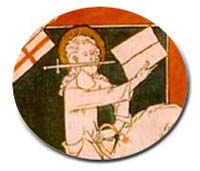 |
Forgotten Truths
Christ Did Not Bring Peace, but the Sword
"You are too controversial!" "Why don't you be a little more mainstream?" "You are raising too much hatred!" We are receiving more and more of these liberal and progressivist exclamations with regard to TIA stances on religion, history, international affairs, the environment, etc.
We are just trying to express Catholic thinking on these topics. If such thinking is controversial, then so be it. It is difficult for a true Catholic not to be controversial, since he is following the steps of his Divine Master, Who did not come to bring peace, but the sword. The words below by the famous commentator of the Gospel, Fr. Louis Claude Fillion, could not be more opportune to answer such objections.
Fr. Louis Claude Fillion
Our Lord Jesus Christ affirms in the Gospel of St. Matthew:
“Do not think that I come to bring the peace upon earth: I came not to send peace but the sword. For I come to set a man at variance against his father, and the daughter against her mother, and the daughter-in-law against her mother-in-law; and the man’s enemies shall be they of his own household. He, who loves father or mother more than Me, is not worthy of Me; and he, who loves son or daughter more than Me, is not worthy of Me. And he, who does not take up his cross and follow Me, is not worthy of Me” (10: 34-38).
The sword, this terrible weapon that symbolizes war à outrance [to the extreme], is placed by the Messiah into the family, into the entire world. Is there anything that can appear stranger and more unexpected than this? Wasn’t the One anticipated by the Prophets supposed to present Himself as a Prince of Peace carrying an olive branch, the pledge of happiness and security? Wasn't He the One at whose birth the Angels sang "peace be on earth" (Luk 2: 14)?
If Jesus Christ affirms, however, that He came to bring war and not peace, it is not because His coming was a direct cause of fighting and dissension for the world , but rather that fighting and dissension would be the natural consequence of the establishment of His kingdom. Christ Himself cannot offer the kiss of peace until the passions and vices have been cut down with the sword.
Moreover, as He said, when His Gospel enters a family, it necessarily causes violent separations, which can even reach hatred on the part of the unbelieving members, as if the bonds of blood were cut.
No one more than Jesus understands how to defend and support these sacred bonds. Nonetheless, the salvation brought by Him, faith in Him, and love for Him must prevail over all else. Anyone who were to think and act differently would be unworthy of Him. Three times he says, Non est Me dignum [he is unworthy of Me]. What strong words! What an elevated concept of His Own nature and His divine mission, the One who used them with such vigor and panache had! Incidentally, it is on this occasion that Jesus presents Himself as the universal center of hearts and minds: Everything in Him, everything for Him.
(L.C. Fillion, Vie de Notre Seigneur Jèsus Christ
– Exposé historique, critique and apologètique,
Paris: Letouzey and Ané, 1925, vol. 2, p. 413).

Posted May 19, 2007


Related Topics of Interest
 Catholic Intransigence Is Tantamount to Catholic Charity Catholic Intransigence Is Tantamount to Catholic Charity
 Just War Supported by Scriptures Just War Supported by Scriptures
 When Silence and Complacence Are Sins When Silence and Complacence Are Sins
 One Should Speak Freely against Heretics and Schismatics One Should Speak Freely against Heretics and Schismatics
 St. John Chrysostom: One Sins by Not Becoming Duly Irate St. John Chrysostom: One Sins by Not Becoming Duly Irate
 Objection: Your Commentaries are Judgmental Objection: Your Commentaries are Judgmental
 The Symbol of the Sword in Today's Defense against Heretics The Symbol of the Sword in Today's Defense against Heretics
 The Fidelity of the Remnant Through History The Fidelity of the Remnant Through History

|
Forgotten Truths | Religious | Home | Books | CDs | Search | Contact Us | Donate

© 2002-
Tradition in Action, Inc. All Rights Reserved
|
 |
|